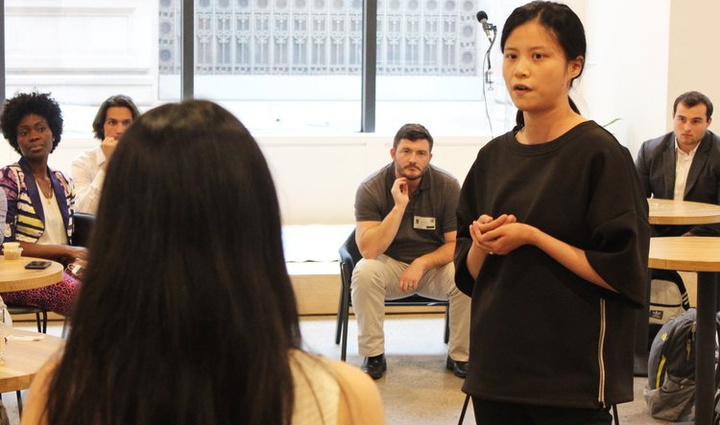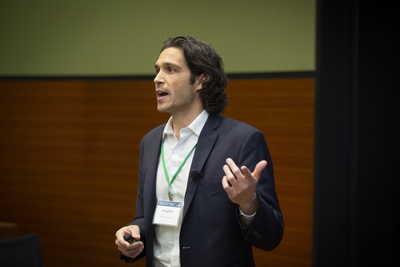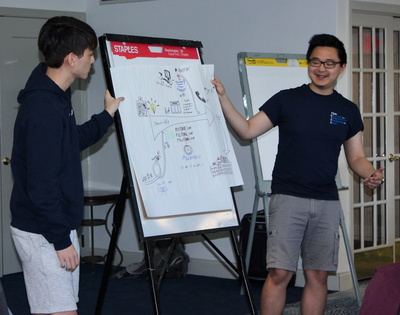Meet Three Teams Empowering Users with New Tech Tools
This summer, ten teams are spending eight intensive weeks with Tsai CITY, working on their ventures and projects as part of the 2019 Summer Fellowship. We’ll be following along as the teams sprint through the program, sharing their goals and experiences. This week, we’re taking a look at three teams that are using software to empower users to streamline processes and make effective decisions.

Edsightful
Chris Cutrona, who recently received his MBA from the Yale School of Management, has spent much of his career working in education, and knows firsthand the power of effective teaching. It was while at Florida’s Miami-Dade County Public Schools, where Cutrona worked as a curriculum support specialist and later a data strategist, that he started developing the idea that would become EdSightful. Cutrona was helping manage the district’s instructional coaching program, a major investment that comprised roughly 300 coaches and curriculum support staff. In this role, he realized that the district had no clear way to measure the effectiveness of the program, and began working on a way to improve their tracking and assessment. “This tool was developed directly out of that need,” he explains.

The result, EdSightful, is an innovation built on a system that many schools and districts already use: the Google Suite for Education, which has over 80 million users worldwide. Enhancing familiar products like Google Forms and Google Sheets with custom-built features, the tool allows users to collect and visualize data in an easy-to-use dashboard — streamlining the process of making informed decisions on teacher support. Cutrona currently has active contracts with two school districts, and he envisions EdSightful helping districts more effectively manage an array of instructional coaching, teacher observation, and teacher evaluation programs.
The Summer Fellowship has given Cutrona space to work on making this vision a reality. “So far, my work on EdSightful has all been on the side,” he says. “I wanted to give myself the summer to work on it full-time. Then the Summer Fellowship opportunity presented itself, and it seemed like a natural pairing — time and an environment where there are other entrepreneurs and mentors around.” So far, he’s made major strides, like filing incorporation paperwork, and has been focusing on generating new clients, a process that he sees as part of a larger conversation. “It’s not just about getting someone to buy your product,” he says. “It’s very much a long-term thing that involves building real relationships.” As he’s built these relationships, he’s learned that remaining nimble enough to adapt his strategy and respond to users’ demonstrated needs is key. Reflecting on the summer and his future plans, he says, “Ultimately, I want to put something out in the world that is actually valuable — and learning from users is a big part of that.”
Pillnotes
Much as a firsthand need for better systems sparked EdSightful’s development, a practitioner perspective lies at the heart of Pillnotes. For Dr. Shawn Ong, a resident physician in internal medicine at Yale New Haven Hospital, walking patients through different medication options is a common part of his job. While explaining factors like side effects and dosage requirements, he’s often found himself grabbing a sheet of paper and hand-drawing comparison charts. Last year, he started thinking about how to translate this cumbersome process to a simpler, digital format — and in early 2018, he brought this idea to the Yale Healthcare Hackathon.

There, the idea connected with students, including members of Helix, “a student-run healthtech incubator that combines undergraduate talent and clinician expertise with the best startup and technical development guidance.” Since then, Ong and a small team of students have been collaborating to turn Ong’s idea into a user-friendly web tool that enables doctors to discuss medication choices visually and side-by-side with patients. “We want to have all the information on one screen, in a simplified format, because a lot of the existing sites physicians use are not organized in a concise way — they’re designed for other purposes, and the terminology is more difficult,” explains Yale undergraduate Jason Lu, a founding Helix team member who is helping lead the charge on Pillnotes.
Along the way, the team has centered clinician perspectives like Ong’s in their design process. A major milestone, Lu says, came about seven months ago, when clinicians used Pillnotes’ app — then designed for iPads — with patients for the first time. “We learned a ton from that experience,” says Lu. “It led to us taking a different product direction, moving away from iPads and toward computer monitors, as we realized that most doctors don’t have iPads just ready to use.” Another milestone came a few months later, when conversations with clinicians and other stakeholders prompted the team to focus their initial launch on psychiatry, a field in which doctors are often talking patients through a wide array of medication options and considerations like side effects matter deeply.
This summer, the team is hard at work refining their user interface and reaching out to psychiatry clinicians, hoping to encourage more doctors to give Pillnotes a try. As they look ahead, they’re thinking about both these more short-term goals and longer-term questions, like whether Pillnotes can do the most good as a for-profit business or an open-source project. As they do this, they’re relishing the chance to devote energy to a project they’re passionate about. Tsai CITY, Lu says, “has created an opportunity for us to just focus on our startup full-time, and that’s been really helpful.”
Typogram
The Typogram team is also spending much of the summer talking to users and refining their product, which is a custom brand-building web app for entrepreneurs and small business owners. Co-founder Hua Shu, a recent MFA graduate of the Yale School of Art, is an expert in design and typography, with years of professional experience under her belt. “Design is something I’ve always been interested in,” she says. “Helping people — and businesses or nonprofits — communicate what they’re trying to do better is definitely a passion of mine.”
Typogram’s first iteration was a web tool that allows users to manipulate and play with fonts, launched largely as a passion-driven experiment. The tool quickly gained traction with designers, getting featured in tech outlets like Y Combinator and attracting, to date, over 30,000 users. As she realized that she was interested in further developing the project, and perhaps working on it full-time, Shu joined Tsai CITY’s spring 2019 Accelerator to boost her startup skills. “We wanted to understand what we were getting into,” she says with a laugh.
Surrounded by fellow student entrepreneurs in her Accelerator cohort, Shu began to see opportunities to expand Typogram’s user base beyond people who already had some design experience. As they worked to build brands from the ground up, members of her cohort frequently asked her for design help, often coming to her with a general sense of what they wanted their brand to look like but unsure where to start. This wasn’t so different from her time working at design agency, where miscommunication between the agency’s clients and its designers had been common. “People don’t always know how to articulate their vision, especially graphically,” she explains.
“There are so many passionate entrepreneurs out there.”
Guided by these insights, Shu and her co-founder are now positioning their product as a tool that can help entrepreneurs and small business owners create their own brand, filling a gap in the market that they see as critical. Rather than leaving entrepreneurs to spend significant time and money with design firms or settle for subpar work, Shu wants to equip them with tools and guidance to translate their vision into compelling graphic designs, providing a basic education in design and typography along the way. To that end, the Typogram team has been focusing on validating their market this summer, doing in-depth user research with entrepreneurs to identify core needs and the features these users would be willing to pay for. This research has enabled them to quickly iterate on the product’s features as they define a go-to-market strategy for the paid product and plan a 2020 launch.
Shu says that connecting with entrepreneurs this summer, both in the Summer Fellowship cohort and through her interviews with potential users, has led to inspiring surprises. “I’ve met all different kinds of people who are doing different cool stuff,” she says, describing conversations with people like a barber who runs a mobile haircutting business. “There are so many passionate entrepreneurs out there.”
Want to hear these teams pitch live? Join us for Demo Day 2019 on July 25!